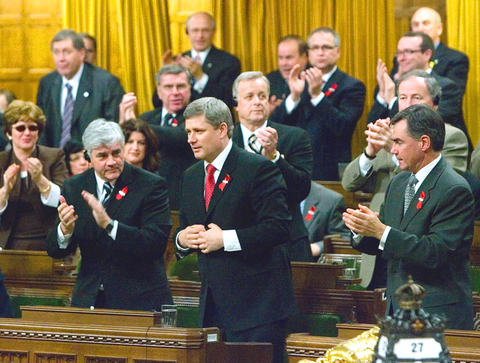Parliament formally recognized the French-speaking people of Quebec as a nation within Canada, a seemingly symbolic gesture that has led to a Cabinet resignation and ignited concerns over a renewed push for the province's sovereignty.
The motion presented by Conservative Prime Minister Stephen Harper on Monday, which says Quebecois form a nation within a united Canada, is largely symbolic in that it requires no constitutional amendment or change of law. The opposition Liberals and New Democrats supported the motion, so it passed easily through the House of Commons.
It was devised by Harper to pre-empt a similar attempt by the Bloc Quebecois, the party in Parliament that represents Quebec, whose members also reluctantly backed the resolution once they realized they had been outflanked by Harper.

PHOTO: AP
The Tories are lagging in popularity in Quebec and Harper believes the formal recognition will win him favor among the traditionally liberal voters in the eastern province.
"This government believes strongly that the time has come for national reconciliation," Harper told the House of Commons hours before the Monday night vote.
But others fear the recognition will be divisive, reigniting hope among Quebec separatists for an independent nation and other ethnic and indigenous groups to demand similar nationhood.
Michael Chong resigned earlier in the day as the intergovernmental affairs minister, saying he could not accept the "ethnic nationalism" implicit in Harper's historic initiative.
"I believe in this great country of ours and I believe in one nation, undivided, called Canada, based on civic and not ethnic nationalism," he said.
Transport Minister Lawrence Cannon, Harper's political lieutenant in Quebec, has insisted the Tory recognition of a Quebecois nation is purely symbolic, with no legal or constitutional consequences. He rejected Chong's suggestion that it could contribute to ethnic division.
"Fundamentally, what we want to do is to bring closure to this issue and start a reconciliation process," he said.
The people of Quebec have twice voted down referendums seeking independence from Canada; the last one narrowly defeated in 1995. Though there are some in Quebec still longing for sovereignty, most Quebecois wish to remain an integral part of Canada.
Gerard Kennedy, one of several front-runners for the Liberal Party leadership, is opposed to Quebec nationhood, dismissing the parliamentary maneuvering over the matter as "game playing."

EUROPEAN TARGETS: The planned Munich center would support TSMC’s European customers to design high-performance, energy-efficient chips, an executive said Taiwan Semiconductor Manufacturing Co (TSMC, 台積電), the world’s largest contract chipmaker, yesterday said that it plans to launch a new research-and-development (R&D) center in Munich, Germany, next quarter to assist customers with chip design. TSMC Europe president Paul de Bot made the announcement during a technology symposium in Amsterdam on Tuesday, the chipmaker said. The new Munich center would be the firm’s first chip designing center in Europe, it said. The chipmaker has set up a major R&D center at its base of operations in Hsinchu and plans to create a new one in the US to provide services for major US customers,

‘ABUSE OF POWER’: Lee Chun-yi allegedly used a Control Yuan vehicle to transport his dog to a pet grooming salon and take his wife to restaurants, media reports said Control Yuan Secretary-General Lee Chun-yi (李俊俋) resigned on Sunday night, admitting that he had misused a government vehicle, as reported by the media. Control Yuan Vice President Lee Hung-chun (李鴻鈞) yesterday apologized to the public over the issue. The watchdog body would follow up on similar accusations made by the Chinese Nationalist Party (KMT) and would investigate the alleged misuse of government vehicles by three other Control Yuan members: Su Li-chiung (蘇麗瓊), Lin Yu-jung (林郁容) and Wang Jung-chang (王榮璋), Lee Hung-chun said. Lee Chun-yi in a statement apologized for using a Control Yuan vehicle to transport his dog to a

BEIJING’S ‘PAWN’: ‘We, as Chinese, should never forget our roots, history, culture,’ Want Want Holdings general manager Tsai Wang-ting said at a summit in China The Mainland Affairs Council (MAC) yesterday condemned Want Want China Times Media Group (旺旺中時媒體集團) for making comments at the Cross-Strait Chinese Culture Summit that it said have damaged Taiwan’s sovereignty, adding that it would investigate if the group had colluded with China in the matter and contravened cross-strait regulations. The council issued a statement after Want Want Holdings (旺旺集團有限公司) general manager Tsai Wang-ting (蔡旺庭), the third son of the group’s founder, Tsai Eng-meng (蔡衍明), said at the summit last week that the group originated in “Chinese Taiwan,” and has developed and prospered in “the motherland.” “We, as Chinese, should never

‘A SURVIVAL QUESTION’: US officials have been urging the opposition KMT and TPP not to block defense spending, especially the special defense budget, an official said The US plans to ramp up weapons sales to Taiwan to a level exceeding US President Donald Trump’s first term as part of an effort to deter China as it intensifies military pressure on the nation, two US officials said on condition of anonymity. If US arms sales do accelerate, it could ease worries about the extent of Trump’s commitment to Taiwan. It would also add new friction to the tense US-China relationship. The officials said they expect US approvals for weapons sales to Taiwan over the next four years to surpass those in Trump’s first term, with one of them saying